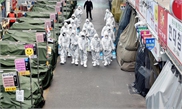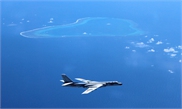US’ efforts to cozy up to Vietnam won’t work

Illustration: Liu Rui/GT
The USS Theodore Roosevelt docked at Da Nang, Vietnam on Thursday, marking the second visit of a US Navy aircraft carrier to the country since the end of the Vietnam War. The USS Carl Vinson visited the port in 2018.
Washington's strategic intent is more than obvious. It's flexing its muscles in an attempt to provoke China. In addition to visiting Vietnam, the US Navy sailed a warship near Nansha Islands in the South China Sea on January 25 during China's biggest annual holiday Spring Festival and just as the country was coping with the initial outbreak of the novel coronavirus. The frequent presence of US aircraft carriers and warships in the South China Sea during such a sensitive period can only be considered an intentional provocation, exposing Washington's attempts to take advantage of China's difficulties and advance its own agenda. Washington continues to exploit the South China Sea disputes. It attempts to draw Vietnam to its side and use the Southeast Asian country as its pawn to contain China. The White House has escalated its conflicts with the Philippines' Rodrigo Duterte administration and now realizes that Vietnam - a country with both the strength and willingness to challenge China - is the only remaining South China Sea territorial claimant that it can utilize.
Southeast Asian countries make up an important part of Washington's Indo-Pacific Strategy, with Vietnam in the key role. US Secretary of Defense Mark Esper said that the withdrawal of US troops from Afghanistan will allow the US to relocate forces to "compete with China." US Secretary of State Mike Pompeo once stated that "China presents the greatest challenge that the United States will face in the medium to long term." The Vietnam card that the US is now playing is a concrete embodiment of its Indo-Pacific Strategy.
The US also hopes to sell arms to Vietnam. Since former US president Barack Obama lifted the US arms embargo on Vietnam in 2016, no substantial deals have been made. President Donald Trump has expressed his dissatisfaction more than once and hopes to speed up the pace of the arms trade between the two sides.
In contrast to the US, Vietnam has been low-key in handling the US aircraft carrier's visit. The welcome ceremony was hosted by local officials instead of the national government.
Vietnam regards the visit as one in a series of activities celebrating the 25th anniversary of the establishment of Vietnam-US diplomatic relations. Vietnam has emphasized that the US warship's visit simply improves its logistics, technical and medical services capabilities in receiving foreign vessels. Vietnam has downplayed the sensitive visit because it doesn't want to upset China.
However, Vietnam's strategic intentions are very clear. Vietnam wants to show China that it has more options, friends and measures than China in terms of maritime disputes and that China must think twice before handling confrontations in the South China Sea. Vietnam also wants to show that it is winning more favors from major powers.
Both Vietnam and the US target China in their strategic cooperation. The two countries also aim to use arms trade to consolidate their relations and cooperation. However, the disputes between Vietnam and the US are also obvious and irreconcilable.
Vietnam obviously does not want to be used as a pawn of the US. Vietnam's "Three Nos" defense policy has determined that the country will not join military alliances. The US surely knows this all too well.
The US and Vietnam have extremely different ideologies, and they have had many disputes on human rights, democracy and freedom of public opinion. This cannot be suddenly changed upon finding a similar strategic objective.
Vietnam is always cautious in terms of its cooperation with other powers. This was the case with China, and it will be the same with the US. After all, a US-Vietnam partnership would be nothing like the partnerships the US has with Japan, South Korea and even the Philippines. It is likely to never be so.
The author is senior research fellow and professor at the Collaborative Innovation Center of South China Sea Studies, Nanjing University. opinion@globaltimes.com.cn


